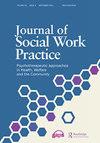The future of social work
IF 1.4
4区 社会学
Q3 SOCIAL WORK
引用次数: 0
Abstract
Despite having practised in many different roles over the 47 years since I took on my first job in social work, I have read very few social work texts thoroughly, finding the theory often lacking a conceptual framework, with unacknowledged biases and implicit perspectives, and over-elaboration obscuring common understanding and everyday concepts. As a social work student in the late 1970s, I was drawn primarily to works in the fields of sociology and social policy which offered plausible frameworks that I could use creatively in my work, whilst Pauline Hardiker’s work on practice theory was for me the most meaningful approach to understanding practice. However, Bill Jordan’s work stood out from most other texts about social work. His direct and clear communicative style, looking at what makes helping work without resorting to jargon, taking account of the relationships between worker and organisation and the person being helped, all made great sense to me. His focus on the importance of material conditions fitted with my own political sensibility. Unlike many writers on social work, he paid attention to the personal and the political, the individual and wider society and the relationship between them. This most recent book is no exception, looking both historically and internationally at social issues and related private troubles and the relationship between this social context and the role of social work. In this book social work emerges as relationship-based in several ways. Firstly, its form is highly dependent on the context in which it takes place. Secondly, it is an activity concerned with relationships. Thirdly, Jordan sees social work as a kind of Socratic endeavour (see p. 77, ‘Social work practice consists in reasoning with fellow citizens about how to deal with stressful situations in dialogues towards negotiated solutions (Jordan, 1990)’. The book is set out in chapters which describe overarching social themes and relate them to social work. In the following overview I focus on the first two chapters in most detail as these set the grounds for the rest of the book.社会工作的未来
自从我从事第一份社会工作以来,我在47年里从事过许多不同的工作,但我很少深入阅读社会工作的文本,发现社会工作理论往往缺乏概念框架,存在未被承认的偏见和隐含的观点,并且过度阐述模糊了共同理解和日常概念。作为20世纪70年代末的一名社会工作专业的学生,我主要被社会学和社会政策领域的作品所吸引,这些作品为我提供了可以在我的工作中创造性地使用的合理框架,而波琳·哈代克(Pauline Hardiker)在实践理论方面的工作对我来说是理解实践最有意义的方法。然而,比尔·乔丹的作品在大多数关于社会工作的文本中脱颖而出。他直接而清晰的沟通风格,在不使用行话的情况下审视帮助的作用,考虑到工作者、组织和被帮助者之间的关系,对我来说都很有意义。他对物质条件重要性的关注符合我自己的政治敏感性。与许多社会工作作家不同,他关注个人与政治、个人与更广泛的社会以及两者之间的关系。这本最新的书也不例外,从历史和国际的角度审视社会问题和相关的私人麻烦,以及这种社会背景与社会工作角色之间的关系。在这本书中,社会工作在几个方面都是以关系为基础的。首先,它的形式高度依赖于它发生的语境。其次,它是一种与关系有关的活动。第三,约旦认为社会工作是一种苏格拉底式的努力(见第77页,“社会工作实践包括与同胞讨论如何在谈判解决方案的对话中处理压力情况(约旦,1990)”。这本书的章节描述了总体的社会主题,并将它们与社会工作联系起来。在下面的概述中,我将最详细地关注前两章,因为它们为本书的其余部分奠定了基础。
本文章由计算机程序翻译,如有差异,请以英文原文为准。
求助全文
约1分钟内获得全文
求助全文
来源期刊

Journal of Social Work Practice
SOCIAL WORK-
CiteScore
2.50
自引率
7.10%
发文量
39
期刊介绍:
The Journal of Social Work Practice publishes high quality refereed articles devoted to the exploration and analysis of practice in social welfare and allied health professions from psychodynamic and systemic perspectives. This includes counselling, social care planning, education and training, research, institutional life, management and organisation or policy-making. Articles are also welcome that critically examine the psychodynamic tradition in the light of other theoretical orientations or explanatory systems. The Journal of Social Work Practice is committed to a policy of equal opportunities and actively strives to foster all forms of intercultural dialogue and debate.
 求助内容:
求助内容: 应助结果提醒方式:
应助结果提醒方式:


